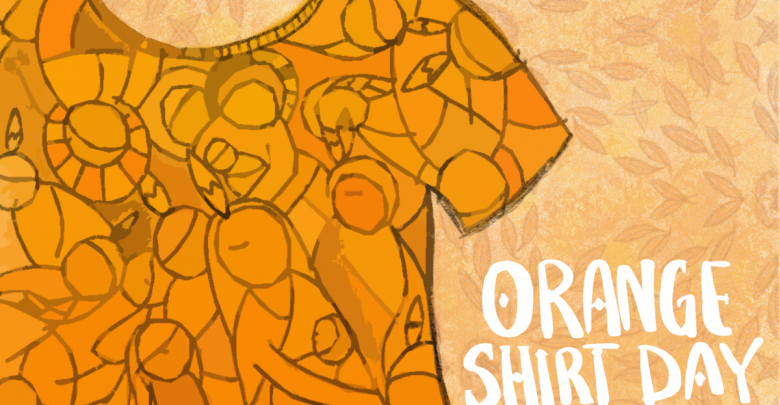U of A to recognize residential school survivors with Orange Shirt Day event on September 28
Organizers hope the event will promote discussion about the impact of residential schools
 Gabrielle Olivia
Gabrielle OliviaOrganizers of the third annual Orange Shirt Day event on campus hope it will spark an important conversation on campus about the impact of residential schools.
September 30 will be Orange Shirt Day, a nationally recognized movement that honours residential school survivors and those who passed away in the residential school system. It will be observed on Friday, September 28 at the University of Alberta.
Shana Dion, assistant dean of First Nation, Metis and Inuit Students at the U of A, is the organiser of the Orange Shirt Day campus event. She started it with her own connection to the event in mind, as her father is a residential school survivor.
“[I helped organize this event] really wanting to honour my father and really honouring the intergenerational survivors that walk the university, that are a part of this university, including myself and others, and wanting to honour their journey,” she said.
In 2015, the Truth and Reconciliation Commission found that more than 150,000 Indigenous children were sent to residential schools from 1883 to 1996 as part of a program of forced assimilation, where more than 3,000 children died while in the system.
Crystal Fraser, a PhD candidate at the U of A who specializes in residential school history, said Orange Shirt Day is important because the impact of the residential school system is still felt today.
“We still have people who attended these residential schools in our communities, we have people who continue to grapple with intergenerational trauma,” Fraser said.
Orange Shirt Day was started in 2013 by Phyllis Webstad, a residential school survivor. The event aims to show support for residential school survivors, their families, and communities, and to continue the reconciliation process.
Those who want to participate in the campus event can wear their own orange shirt or buy one from the bookstore. A picture of faculty and students in orange shirts will be taken on the Main Quad on Friday at 12 p.m.
Event organizers will be selling orange shirts and talking with staff and students in the bookstore on Thursday afternoon from 1 p.m. to 4 p.m. and Friday from 9:00 a.m. to 11 a.m. Orange t-shirts will be on sale for $20 and all proceeds will go towards cultural programming for students at the U of A to support cultural identity on campus.
Dion hopes that the day starts an important conversation with diverse groups on campus about what the Orange Shirt Day movement and the history of residential schools mean to different people.
“I want to see more allyship and I want to see more friendships and I want to see more dialogue,” Dion said. “I want to see more joining the circle… and really having this conversation around what this means, because it’s going to mean something different to everybody.”
However, Fraser added that it can be difficult for Indigenous and non-Indigenous faculty and students to have a conversation about residential schools.
“For Indigenous people, speaking about residential schools can be uncomfortable because we went through a lot of trauma,” she said. “For everyday Canadians, I can also understand that it must be hard.”
While both Dion and Fraser understand that it can be an uncomfortable subject, both of them said Orange Shirt Day starts an important dialogue through the demonstration of support and community.
“[Orange Shirt Day] is about coming together,” Dion said. “It’s healing wounds that have been a part of Canada’s history for a very long time.”
“I think it’s a day of education, but it’s also a day to remember the thousands of children that went to residential schools, and also all the children who passed away at those schools,” Fraser said.
For students who want to learn more about the history of residential schools in Canada, Fraser suggests the University of Alberta’s massive open online course, “Indigenous Canada.”
While the topic of residential schools is difficult, Dion said she wants Orange Shirt Day to bring a diverse group of people together to join in the dialogue.
“This isn’t about a negative experience,” Dion said. “This is about uplifting, hope, inspiration and really uplifting the students on this campus in a way where, hopefully, one day, racism doesn’t exist.”




